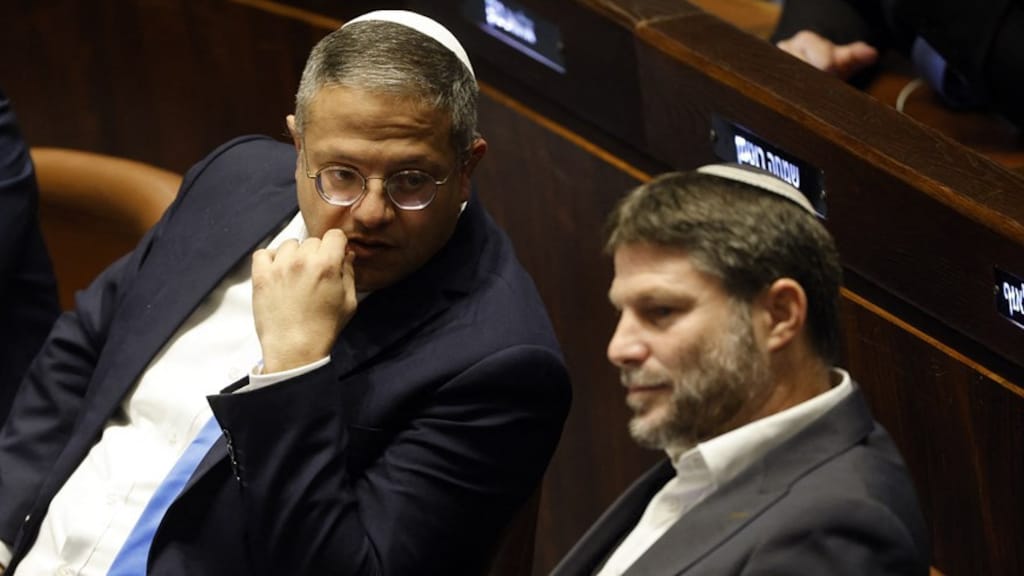Table of Contents
- 1 ‘Unparalleled in Human Suffering’
- 2 Sanctions
- 3 ‘colonize Gaza’
- 4 Conversation in Brussels
- 5 The Dutch situation
- 6 ‘Dying after death’
- 7 How does the Netherlands’ historical relationship with Israel and its current political landscape influence its approach to the situation in Gaza and the potential for EU sanctions against Israeli ministers?
By Fons Lambie, Roel Schreinemachers and Pepijn Nagtzaam·45 minutes ago·Modified: 1 minute ago
RTL
The Netherlands and other EU countries are struggling with the situation in Gaza and possible sanctions against Israel. This is evident from secret diplomatic documents from the Ministry of Foreign Affairs, which were seen by the political editors of RTL News. These paint a bleak picture of the humanitarian situation in Gaza.
The government also wants Israel to report on this, but at the same time it does not want to offend the Israeli government too hard, the documents show. For example, in the past months there has been a debate again about sanctions against two ministers from the far left of the Israeli cabinet, but the European member states cannot agree.
The Netherlands is hesitant: The Hague does not completely reject the sanctions plan, but it does not fully support it either.
‘Unparalleled in Human Suffering’
In the secret documents, diplomats describe the situation in Gaza as ‘unprecedented in terms of human suffering’. Gaza has become a ‘nightmare’, there is ‘hunger’ and ‘17,000 children are leaving alone’, the documents say.
Additionally, violence by Israeli settlers in the West Bank is at its “highest level in years.” And not only is the humanitarian situation in Gaza very bad, but the Palestinian economy is also being completely destroyed, diplomats write.
Sanctions
To increase pressure on Israel, European member states have been arguing for months about possible sanctions against two members of the Israeli cabinet. These are the ministers Itamar Ben-Gvir (National Security) and Bezalel Smotrich (Finance). Sanctions may include travel restrictions or freezing bank accounts in the European Union.
 © EPA
© EPAOrganizations that support Israeli settlers may be targeted with sanctions. This is about, for example, ‘Revagim’, an organization founded by Smotrich.
The two ministers are seen as ‘ultranationalists’, major forces within the Israeli cabinet, diplomats write. They both live in illegal settlements in the West Bank and are very active (and popular) in settler movements. Ben-Gvir gave thousands of assault rifles to settlers last year.
‘colonize Gaza’
The ministers want Israel to repopulate occupied Gaza and they took part a few weeks ago in a special conference entitled ‘Preparing to settle Gaza’. Diplomats wrote that Israeli Prime Minister Netanyahu is against the settlement of Gaza, but that ministers are pushing the plans.
Within the Israeli government, ministers have gained a lot of power in recent months. mentioned in the documents. Netanyahu’s government has a slim majority and cannot afford to lose the support of major parties. “Netanyahu can keep insisting that he has two hands on the wheel, but his colleagues in the far-right coalition rule the way,” diplomats wrote.
Conversation in Brussels
The Netherlands wants a decision on sanctions in a European context. Sanctions are always agreed in consultation with other Member States. But in the European Union, member states are diametrically opposed to each other in this matter, as it became clear in early September.
In particular, Germany and Italy and several Eastern European countries (Bulgaria, Slovakia, Hungary, the Czech Republic, Romania) are against sanctions. They fear that sanctions would ‘incentivize ‘Israel and ‘us from us’, which ‘makes mediation work more difficult for the EU’. A possible pause would then be more difficult.
But according to EU officials, Israeli ministers are actually standing in a deadlock because of ‘their fiery language’. Countries such as France, Ireland, Poland, Slovenia, Portugal and Belgium want to impose sanctions. Paris and Warsaw believe that the ‘possible consequences for ‘the political relationship’ should be investigated.
The possibility of sanctions was discussed again in October and November, but the deep divisions in Brussels remain. Time and again no decision is reached.
The Dutch situation
The Dutch cabinet supports sanctions against the Revagim group, but they have not yet approved sanctions against the ministers, the documents show. At one point, diplomats suggest that The Hague and Paris could try to change the minds of the Germans so that at least sanctions against Revagim are given.
For Minister Veldkamp (Foreign Affairs), the possible sanctions against Israeli cabinet members are complicated. The cabinet is supported by the PVV, which has a problem with the sanctions. Wilders is known to openly support politicians such as Ben-Gvir.
‘Dying after death’
The documents show not only the seriousness of the situation in Gaza, but also the economic problems in the Palestinian territories. Israel ‘continues to paralyze the economy’ in the West Bank, diplomats write.
Travel restrictions make work in Israel ‘impossible’ and trade ‘unprofitable’. The Palestinian authorities are almost bankrupt, support from the European Union ‘helps to keep their heads above water, but not more than that’, diplomats write. In Gaza, the economy is ‘dead’ and almost all residents are below the poverty line.
“If you read the documents, you will see a struggle and a lack of power in the majority. In The Hague and Brussels,” said the political commentator Fons Lambie. “The EU countries are very divided: several countries support Israel, several countries have a little more sympathy for the Palestinians. Because of this division, the EU’s stances are always half-hearted. it is not in Israel, and not in the rest of the world.”
2024-11-21 09:39:00
#situation #Gaza #unique #Netherlands #struggling #Israeli #sanctions

How does the Netherlands’ historical relationship with Israel and its current political landscape influence its approach to the situation in Gaza and the potential for EU sanctions against Israeli ministers?
## Open-Ended Discussion Questions based on the RTL News Article
This article presents a complex situation with various stakeholders and perspectives. Here are some open-ended questions designed to encourage discussion and explore different viewpoints:
**Section 1: The Humanitarian Crisis in Gaza**
* The article describes the situation in Gaza as “unprecedented in terms of human suffering.” What factors contribute to this dire situation, and what are the consequences for the people living there?
* How can the international community effectively address the humanitarian crisis in Gaza while respecting the complexities of the Israeli-Palestinian conflict?
**Section 2: EU Sanctions Against Israeli Ministers**
* Should the European Union impose sanctions on Israeli ministers Itamar Ben-Gvir and Bezalel Smotrich? What are the potential benefits and drawbacks of such a move?
* The article mentions that some EU member states support sanctions while others oppose them. What are the underlying reasons behind these differing opinions?
* How might sanctions impact the Israeli government’s policies and the chances of a peaceful resolution to the conflict?
**Section 3: The Role of the Netherlands**
* The Netherlands is presented as hesitant to fully support sanctions against the Israeli ministers. What are the political considerations influencing this stance, especially given the presence of the PVV in the Dutch government?
* What are the Dutch government’s available options for responding to the situation in Gaza and the policies of the Israeli government?
**Section 4: The Economic Impact on Palestinians**
* The article highlights the economic struggles faced by Palestinians in the West Bank and Gaza. How does Israel’s control over the movement of people and goods impact the Palestinian economy?
* What measures could be taken to support the development of a sustainable Palestinian economy?
**Section 5: The Future of the Israeli-Palestinian Conflict**
* Given the current political climate and the deep divisions within the EU, what are the prospects for a peaceful resolution to the Israeli-Palestinian conflict?
* How can the international community encourage dialog and compromise between the two sides?
* What role can civil society organizations and individuals play in contributing to a lasting peace?
These questions aim to provoke thoughtful discussion and encourage participants to consider the complexities of the situation from various angles.

